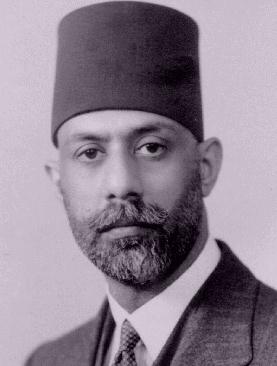Related Research Articles

Kashmir is the northernmost geographical region of the Indian subcontinent. Until the mid-19th century, the term "Kashmir" denoted only the Kashmir Valley between the Great Himalayas and the Pir Panjal Range. The term has since come to encompass a larger area that includes the India-administered territories of Jammu and Kashmir and Ladakh, the Pakistan-administered territories of Azad Kashmir and Gilgit-Baltistan, and the Chinese-administered territories of Aksai Chin and the Trans-Karakoram Tract.

Choudhry Rahmat Ali was a Pakistani nationalist activist who was one of the earliest proponents of the creation of the state of Pakistan. He is credited with creating the name "Pakistan" for a separate Muslim homeland in British India and is generally known as the originator of the Pakistan Movement.
Laur, Lava, Lavi or Lor is a major clan of the Gurjar ethnic community of northern India.

The Bakarwal, are a nomadic ethnic group who along with Gujjars, have been listed as Scheduled Tribes in the Indian Union Territory of Jammu and Kashmir and Ladakh since 1991. Bakerwal and Gujjar is the largest Muslim tribe and the third-largest ethnic community in the Indian part of Jammu and Kashmir.
Kalsian, also spelled Kalsiyan or Kalsyan, is a clan of the Gujjar ethnic community based in India and Pakistan.

Gujari is an Indo-Aryan language spoken by most of the Gujjars in the northern parts of India and Pakistan as well as in Afghanistan. It is a member of the Rajasthani group of languages.
The Gurjar are an agricultural ethnic community, residing mainly in India, Pakistan, and Afghanistan, divided internally into various clan groups. They were traditionally involved in agriculture, pastoral and nomadic activities and formed a large heterogeneous group. The historical role of Gurjars has been quite diverse in society: at one end they have been founders of several kingdoms and dynasties and, at the other end, some are still nomads with no land of their own.
Chopra, is a clan found in the Gurjar ethnic community of Pakistan and India.

Khatana is a major and ancient clan of the Gurjar community of India, Afghanistan and Pakistan. They follow several religions, including Hinduism, Islam, and Sikhism.
Doi is a sub clan of the Gurjar/Gujjar ethnic group of Pakistan and India.
Thikariya or Thikriya is a subcaste of the Thakkar's clan, found among the Muslim and Hindu and possibly some sikh Gujjars. The variations of the clan name include Thikariya, Thikria, Thikaria, Thekaria, or Thekria..
Hakla, some time spelled as Haklla or Akla is a clan originally affiliated with the Gurjar/Gujjar ethnic group of south Asia. They are mostly found among the Hindu and Muslim Gujjars.
Kala Kamala is a village located within the Gujrat district of Punjab, Pakistan, it is approximately 88 miles southeast of Islamabad, the capital city of the country. The village was said to have been founded by two brothers, Kala and Kamala, belonging to the Gujjar ethnic group, and stands as a cultural emblem of the Gujjar community's heritage in the region.
Gegi, Gaigi, or Gegian is a clan (subcaste) of the agricultural Punjabi Gujjar community of Punjab. Their main villages are found in Jehlum, Gujjaranwal, and Gujarat districts in the central Punjab. But their also found in Jammu and Kashmir, Gilgit-Baltistan and Pakistani-administrated-Kashmir.

Javaid Rahi is an Indian author, researcher and tribal social worker. He is a writer and poet of Gojri, Punjabi and Urdu languages. He has written 25 books and edited over 300 books and issues of magazines in different languages especially in the field of tribal literature, history, and culture of pastoralists including Gujjars, Bakarwals, Shina-Dard, Sippis, and Gaddis— and other Scheduled Tribes groups of India.
Charr/Charrh/Char is a sub clan of Gurjar/Gujjar ethnic group of India,Pakistan & Afghanistan.
Gautam Sharma "Vyathit", is a folklorist, playwright, and poet from Himachal Pradesh, India. He is also known as Gautam Chand Sharma "Vyathit" or just Gautam Vyathit. He is noted for his literary works in Dogri and Hindi, as well as for his various efforts to preserve and nurture the endangered folk arts of Himachal Pradesh, especially those of the Kangra region. Vyathit was the joint recipient of the 2007 Sahitya Akademi Award for his contributions to Himachali languages and literature. 'Vyathit', Gautam Sharma's pen-name in Hindi, means 'pained', or 'distressed'.
Chawari or Chhawari is a subcaste (gotra) of the Gujjar community with no particular religious identity; they're found among Hindu and Muslim Gujjars. They mostly inhabit in the land of five rivers Punjab, Pakistani Kashmir, Himachal Pradesh, Uttarakhand and Jammu and Kashmir.

Gadharona Balaji Temple is a temple in Gadharona village near Landhaura town of district Haridwar Uttarakhand, in which the idol of Lord Hanuman is installed. The temple is from ancient times.
References
- ↑ Himalayan Research and Cultural Foundation (2000). Himalayan and Central Asian Studies: Journal of Himalayan Research and Cultural Foundation (Volume 4 ed.). The Foundation. p. 7.
- ↑ Ghosh, Anandamayee (2007). The Bhotias in Indian Himalayas: A Socio-linguistic Approach. B.R. Publishing Corporation. pp. 109 and 113. ISBN 978-81-7646-569-4.
Gujjars (Muslims and Hindus and of no particular religious identity) are Dodhi Gujjars , Banjara Gujjars , Bakerwal Gujjars with minor subgroups like Hakla, Bajjar, Kohli, Chechi, Khatana, Badhana, Bagdi, Goosi and Kalas etc.
- ↑ Rahi, Javaid. The Gujjars -Vol 04 (Gujjars History & Culture) by Dr. Javaid Rahi. Jammu and Kashmir Acacademy of Art, Culture , Languages , Jammu. p. 398.
- ↑ Shashi, Shyam Singh (2006). The World of Nomads. Lotus Press. p. 87. ISBN 978-81-8382-051-6.